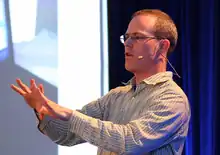Roni Zeiger | |
|---|---|
 Zeiger (2014) | |
| Nationality | American |
| Education | Stanford Medical School |
| Medical career | |
| Profession | Doctor |
Roni F. Zeiger is an American physician and technologist. He is notable for his work as the Chief Health Strategist (2006–2012) at Google where he developed Google Health and Google Flu Trends.[1] He is a co-founder of the Smart Patients project. In 2019, Zeiger announced he would be joining Facebook as the Head of Health Strategy.[1]
Education
Zeiger received his medical degree at Stanford University, including a master's degree in biomedical informatics and he did his residency at University of California, San Francisco (UCSF).[2] He was an internist by training.[3] He became interested in the application of technology in healthcare during his medical training, and noticing how difficult it was to find things in the medical records and how as time went on, the records got larger and more difficult to navigate.[3]
Work
Zeiger did primary care for some time.[4] Zeiger has been profiled for partnering tech companies to health efforts.[5]
Zeiger was Chief Health Strategist (2006–2012) at Google where he worked on Google Health, symptom, anatomy, and health search on Google Search, and Google Flu Trends.[2][6][7]
Smart Patients
With Gilles Frydman, founder of the Association of Cancer Online Resources, Zeiger co-founded the Smart Patients project.[8][9] The project is a search engine and social media platform which connects clinical trial participants in cancer studies to each other for personal conversations.[10][11][12]
Bibliography
This is a select list of some of Zeiger's writings.
- Zeiger, R. F. (2005). "Toward continuous medical education". Journal of General Internal Medicine. 20 (1): 91–94. doi:10.1111/j.1525-1497.2004.30049.x. PMC 1490033. PMID 15693934. S2CID 21839149.
- Johnson, Christopher D.; Zeiger, Roni F.; Das, Amar K.; Goldstein, Mary K. (2006). "Task Analysis of Writing Hospital Admission Orders: Evidence of a Problem-Based Approach". AMIA Annual Symposium Proceedings. 2006: 389–393. PMC 1839659. PMID 17238369.
- Zeiger, Roni (2009-03-24). "The Last Mile Problem in Health". Huffington Post (Blog).
- Zeiger, Roni (2011-11-09). "Doctor's 'Worst Ever' Headache, and Learning the Patient Story". ABC News.
References
- 1 2 "Google vet Roni Zeiger leaves Smart Patients to head up Facebook's growing health efforts". MobiHealthNews. 2019-05-28. Retrieved 2020-01-29.
- 1 2 "Roni Zeiger MD - Mayo Clinic". mayo.edu. Center for Transform2013. 2013. Archived from the original on June 3, 2013. Retrieved 6 June 2013.
- 1 2 "A Chat with Roni Zeiger, MD CEO 'Smart Patients'". BlogTalkRadio (Radio recording). 24 April 2013. 2:45. Retrieved 2020-01-30.
- ↑ Zeiger, Roni (2013). "Official Blog: Is there a doctor in the family?". googleblog.blogspot.com. Retrieved 6 June 2013.
- ↑ Heger, M. (2010). "Tech meets bio: software and technology companies have increasingly been taking a more active role in biological research: Roni Zeiger, Michael Montalto, Ajay Royyuru and Stephen Emmott" (PDF). Nature Medicine. 16 (8): 844–847. doi:10.1038/nm0810-844. PMID 20689541. S2CID 205381392.
- ↑ Zeiger, Roni (6 October 2009). "Google Flu Trends Overview - YouTube". youtube.com. Retrieved 6 June 2013.
- ↑ "Roni Zeiger". TEDMED. Retrieved 2020-01-30.
- ↑ Stanley, Sarah (24 April 2013). "Smart Patients: Groundbreaking Website Supports Conversations among Cancer Patients | Cancer Commons". cancercommons.org. Retrieved 6 June 2013.
- ↑ Dolan, Bryan (23 April 2013). "Google's ex-Chief Health Strategist launches startup, Smart Patients | mobihealthnews". mobihealthnews.com. Retrieved 6 June 2013.
- ↑ Herper, Matthew (24 April 2013). "A Former Google Exec Aims To Power A Patient Revolution - Forbes". forbes.com. Retrieved 6 June 2013.
- ↑ "Smart Patients: Groundbreaking Website Supports Conversations among Cancer Patients". cancercommons.org. Retrieved 27 April 2016.
- ↑ Levingston, Suzanne Allard (30 November 2015). "Does your doctor listen when you talk?". The Washington Post. Retrieved 27 April 2016.
External links
- personal homepage
- Smart Patients official website
- Video: Who is the real medical expert?, TEDMED Talks from TEDMED 2013 conference (April 2013)
- Radio: A Chat with Roni Zeiger, MD CEO 'Smart Patients', (April 2013) from This Week in Health Innovation